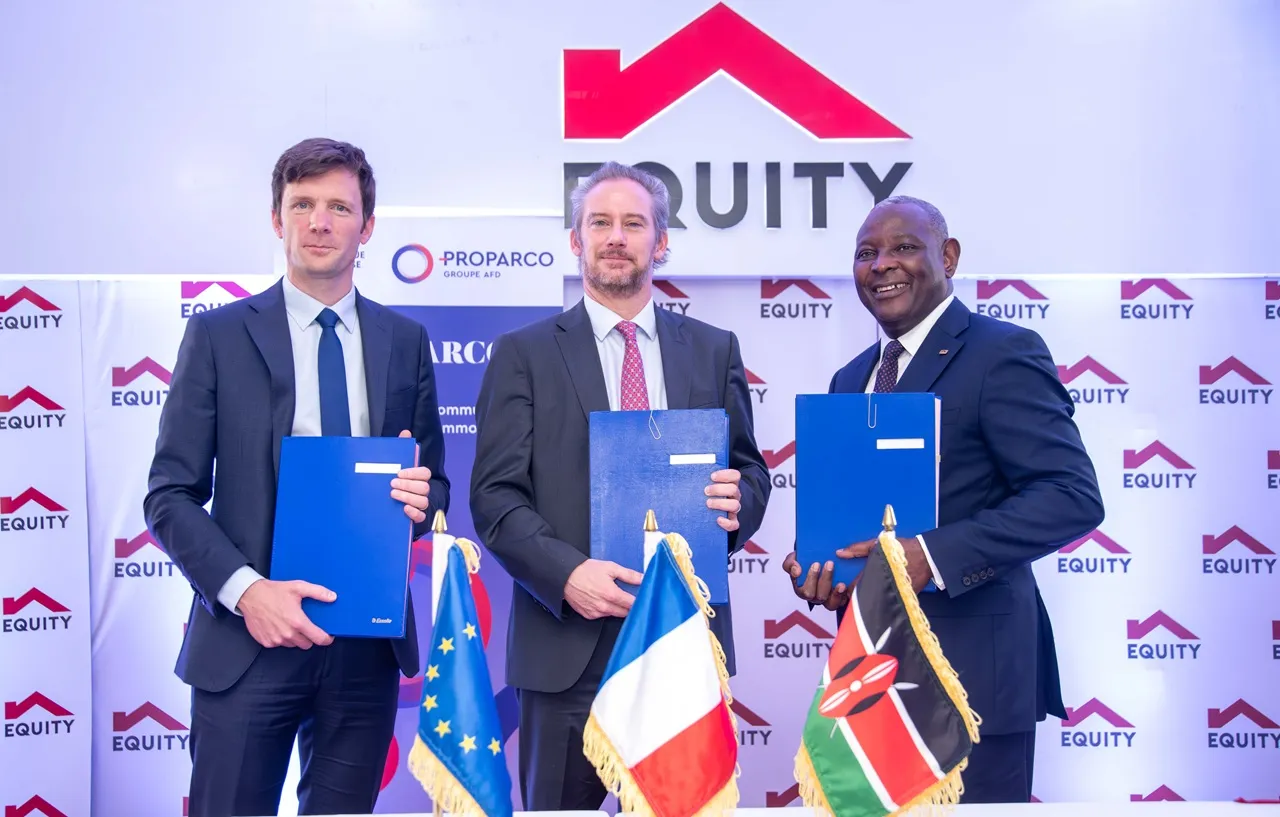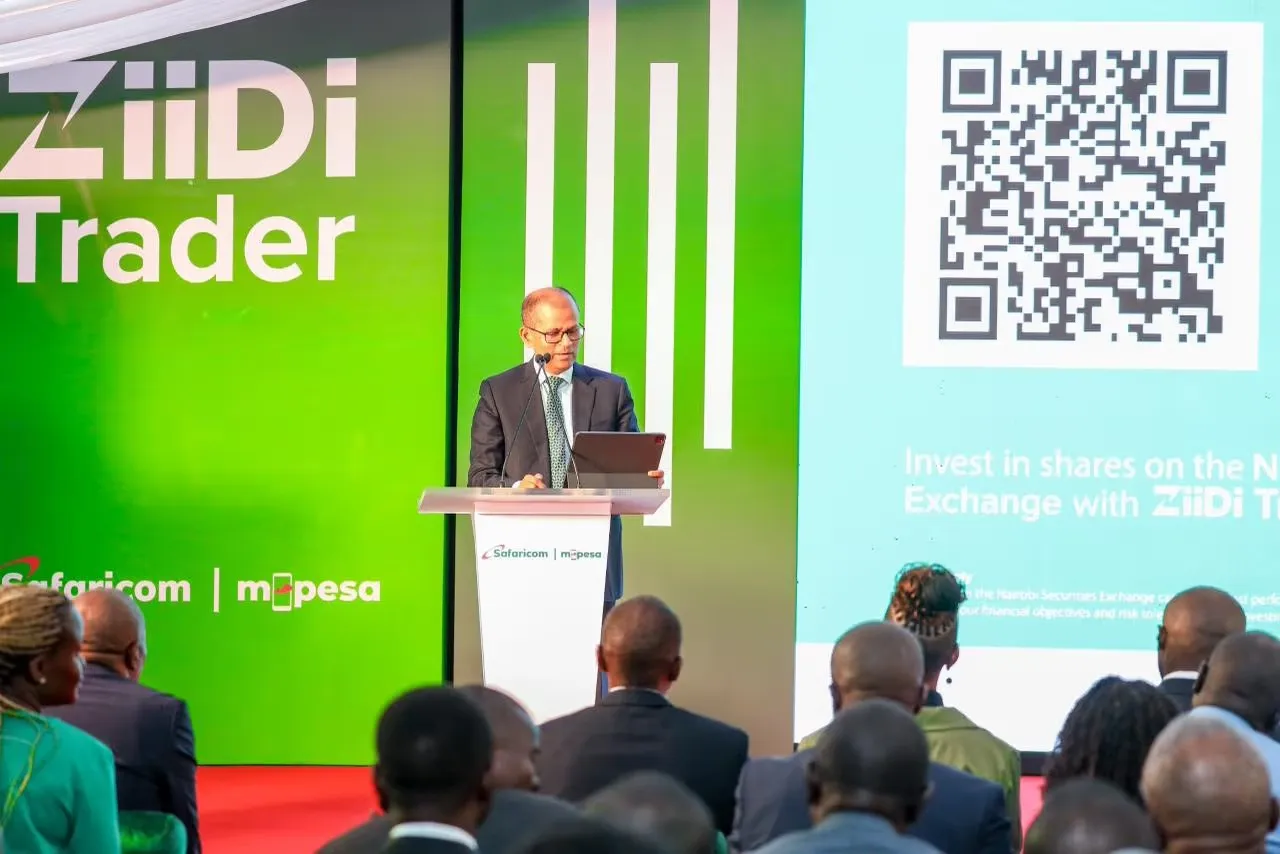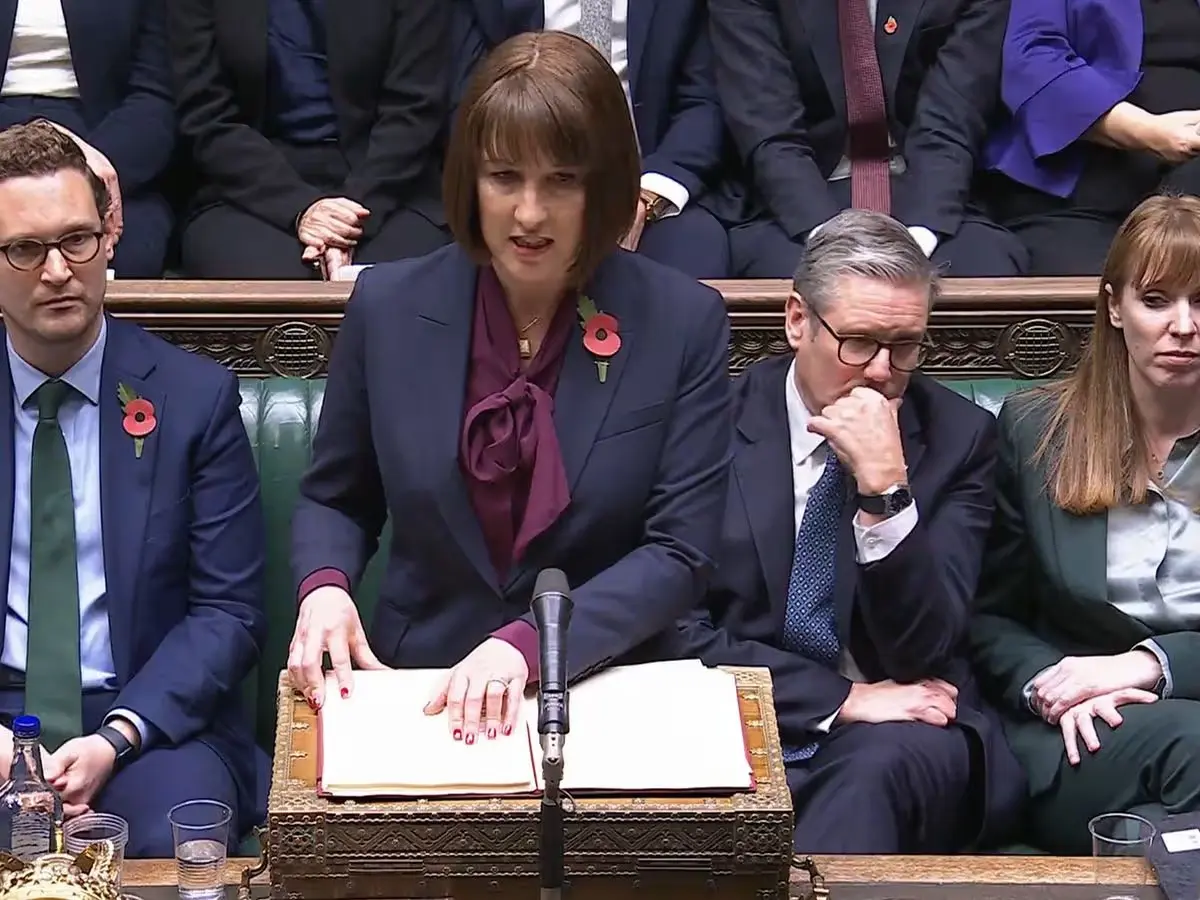In a landmark move that underscores the growing importance of sustainable agriculture in Kenya, Proparco, the French development finance institution, together with Equity Group, has signed a groundbreaking agreement. The grant—totaling Sh141,260,000 in technical assistance—is earmarked for the implementation of the “Climate Resilient Agri-Food Systems” (CRAFS) project by the Equity Group Foundation (EGF). The initiative is designed to empower smallholder farmers across Kenya by facilitating the adoption of climate-smart agriculture (CSA) practices, thereby increasing productivity, enhancing resilience to climate shocks, and reducing greenhouse gas emissions.
The signing ceremony, held in Nairobi on March 19, 2025, was attended by key stakeholders, including the French Ambassador to Kenya, Arnaud Suquet, Proparco’s Regional Director for East Africa, Jean Guyonnet-Dupérat, and Equity Group CEO Dr. James Mwangi. Their presence signaled strong bilateral commitment and the pivotal role that such partnerships play in driving sustainable development and economic transformation in Kenya.
A Strategic Partnership for Sustainable Agriculture
Agriculture is the backbone of Kenya’s economy, contributing approximately 30 percent of the Gross Domestic Product (GDP) and accounting for 45 percent of the country’s export earnings. It supports the livelihoods of nearly 75 percent of rural communities and employs over 70 percent of the rural workforce, with women and youth making up a significant portion of this demographic. Recognizing this, the CRAF project is positioned as a critical intervention aimed at addressing the vulnerabilities faced by smallholder farmers in an era of climate uncertainty.
The CRAF project, implemented by Equity Group Foundation, seeks to provide a holistic package of support that includes training, financial access, and knowledge exchange. This support is delivered through a dedicated field team that works directly with farmers to implement CSA practices. By linking farmers to suppliers and value chain actors, the project aims to empower not only the producers but also the entire ecosystem involved in food production and distribution.
Dr. James Mwangi, CEO of Equity Group, emphasized the transformative potential of the project:
“By embracing climate-smart agriculture, we will empower farmers to increase their productivity, build resilience against climate shocks, and contribute to a more sustainable future. This partnership is about farmers, families, communities, and nations gaining the knowledge and support they need to thrive in a changing world.”
The Need for Climate-Smart Agriculture in Kenya
Kenya, like many countries in sub-Saharan Africa, is grappling with the effects of climate change. Erratic rainfall, prolonged droughts, and extreme weather events have significantly disrupted traditional farming practices, putting smallholder farmers at risk. The adoption of climate-smart agriculture is not merely an option; it has become a necessity. CSA integrates sustainable production methods with practices that enhance the resilience of farming systems to climatic stresses.
Key elements of climate-smart agriculture include:
- Improved Water Management: Efficient water harvesting and irrigation techniques are critical in a country where water scarcity can mean the difference between a successful harvest and crop failure. Techniques such as drip irrigation, rainwater harvesting, and the use of water-efficient crops are being promoted.
- Soil Health Management: Sustainable soil practices, including crop rotation, organic fertilization, and conservation agriculture, help maintain soil fertility and reduce erosion.
- Diversification of Crops: By diversifying crops and integrating livestock, farmers can mitigate risks associated with the failure of a single crop due to adverse weather conditions.
- Adoption of Technology: The integration of digital tools and remote sensing technology allows farmers to monitor crop health, forecast weather patterns, and make informed decisions about planting and harvesting schedules.
- Access to Credit and Insurance: Financial tools such as crop insurance and low-interest loans enable farmers to invest in resilient agricultural practices without being overwhelmed by the risks associated with climate variability.
The CRAF project is designed to address these areas by providing targeted training, access to modern agricultural tools, and financial products that lower the barrier to adopting new practices.
How the CRAF Project Will Transform Smallholder Farming
Targeting 15,000 Farmers Annually
One of the ambitious targets of the CRAF project is to reach at least 15,000 smallholder farmers every year. These farmers, engaged in both livestock and crop value chains, stand to benefit from the extensive support package provided by the project. By equipping farmers with practical knowledge and modern agricultural techniques, the project aims to transform traditional farming methods into more productive, resilient, and sustainable practices.
Training and Capacity Building
The project will roll out comprehensive training programs that cover a broad range of topics, including:
- Sustainable Production Practices: Training on sustainable farming techniques that minimize environmental degradation while maximizing yield.
- Climate Resilience Strategies: Educating farmers on how to anticipate and adapt to climate-related risks.
- Efficient Use of Inputs: Techniques to optimize the use of fertilizers, water, and other inputs, reducing waste and lowering costs.
- Market Linkages: Building skills in value addition and market access, ensuring that farmers can get fair prices for their produce.
By focusing on capacity building, the CRAF project is not only enhancing agricultural productivity but also empowering communities to become self-reliant and innovative.
Financial Access and Knowledge Exchange
Access to finance is a critical challenge for many smallholder farmers. The CRAF project is designed to bridge this gap by facilitating access to affordable credit and insurance products. By partnering with financial institutions, Equity Group Foundation is working to ensure that farmers have the financial tools they need to invest in improved agricultural practices and technologies.
Knowledge exchange is another pillar of the project. The initiative will establish platforms for farmers to share experiences, challenges, and successes, thereby fostering a community of practice. This network of information exchange will be crucial in disseminating best practices and driving collective progress.
Strengthening the Value Chain
The success of agriculture in Kenya is closely linked to the strength of its value chain. The CRAF project recognizes that farmers do not operate in isolation; they are part of a broader ecosystem that includes input suppliers, processors, distributors, and retailers. The project will work to ensure that all these actors are integrated into the value chain, creating a more cohesive and efficient system.
By linking smallholder farmers with value chain actors, the project will facilitate better market access, reduce post-harvest losses, and create opportunities for value addition. This, in turn, will lead to higher incomes for farmers and contribute to overall economic growth.
The Role of Proparco and Equity Group
Proparco: A Catalyst for Sustainable Development
Proparco, as the French development finance institution, has a long history of supporting sustainable development projects around the world. Its involvement in the CRAF project is part of a broader strategy to invest in initiatives that have a lasting impact on environmental sustainability and economic resilience. Proparco’s technical assistance is aimed at ensuring that the project is implemented effectively and that its benefits are maximized over the long term.
Jean Guyonnet-Dupérat, Proparco’s Regional Director for East Africa, highlighted the significance of this partnership:
“Our technical support backs this approach, and we thank Equity Group Foundation for its trust. By supporting Kenyan actors in agriculture—from small farmers to innovators—we are contributing to a transformative change that will bolster food security and enhance rural livelihoods.”
Equity Group Foundation: Driving High-Impact Development
Equity Group Foundation (EGF) has emerged as a leading force in driving high-impact development programs in Kenya. With a strong track record of supporting initiatives in agriculture, health, education, fintech, and renewable energy, EGF is well-positioned to implement the CRAF project. The foundation’s deep understanding of local contexts and its ability to mobilize resources effectively have been instrumental in its success.
Dr. James Mwangi, CEO of Equity Group, stressed that this partnership is a milestone in the journey of empowering communities. “Our partnership with Proparco is not just about financial support; it’s about fostering an environment where smallholder farmers can thrive, where innovation is nurtured, and where sustainable practices become the norm,” he stated.
The Broader Impact on Kenya’s Agricultural Landscape
The adoption of climate-smart agriculture has far-reaching implications for Kenya’s economy. Agriculture remains the cornerstone of rural livelihoods, and any improvement in this sector can lead to significant gains in economic productivity and social stability. By equipping smallholder farmers with the tools and knowledge to adapt to climate change, the CRAF project is poised to drive a ripple effect across the agricultural value chain.
Boosting Productivity and Ensuring Food Security
One of the primary benefits of the CRAF project is the anticipated increase in agricultural productivity. With modern, sustainable practices in place, farmers can expect higher yields and more consistent production levels. This is particularly crucial in a country where food security is closely linked to the stability of rural communities.
Enhanced productivity will also contribute to lower food prices and greater availability of locally produced food, reducing reliance on imports. In turn, this will have a positive impact on the nation’s trade balance and overall economic resilience.
Enhancing Climate Resilience
Climate change poses a significant threat to agriculture in Kenya. By integrating climate-smart practices, the project will help farmers build resilience against droughts, floods, and other extreme weather events. This resilience is critical not only for sustaining agricultural output but also for protecting the livelihoods of millions of people who depend on farming.
The project’s focus on climate resilience extends beyond immediate agricultural practices. It includes building adaptive capacity through better resource management, diversifying income sources, and promoting practices that mitigate the adverse effects of climate change. As farmers become more resilient, communities will be better equipped to face the uncertainties of a changing climate.
Empowering Women and Youth
In Kenya, women and youth constitute a significant proportion of the agricultural workforce. By targeting smallholder farmers, the CRAF project also aims to empower these groups. Training and capacity-building initiatives are designed to ensure that women and young farmers have equal access to new technologies, financial services, and market opportunities. Empowerment in this context translates into improved incomes, greater food security, and enhanced community well-being.
Promoting Sustainable Practices Across the Value Chain
Sustainability is a core component of the CRAF project. By promoting practices that reduce agricultural emissions, conserve water, and improve soil health, the initiative is contributing to a broader environmental agenda. This sustainable approach not only benefits the environment but also opens up new opportunities in the emerging green economy. For instance, by promoting the use of renewable energy and waste-to-energy technologies, the project can help create new revenue streams for rural communities while reducing reliance on fossil fuels.
Regional and International Implications
The CRAF project is part of a larger global trend toward sustainable agriculture and climate resilience. International agencies, development finance institutions, and governments around the world are increasingly recognizing the importance of investing in agriculture as a pathway to sustainable development. In this context, Proparco’s grant is not only a boost for Kenya but also a model for similar initiatives across sub-Saharan Africa.
The project aligns with several international frameworks, including the United Nations Sustainable Development Goals (SDGs), particularly SDG 2 (Zero Hunger), SDG 13 (Climate Action), and SDG 8 (Decent Work and Economic Growth). By addressing these interconnected goals, the CRAF project contributes to a global movement toward building resilient, sustainable food systems.
Challenges and the Road Ahead
While the CRAF project is poised to deliver significant benefits, several challenges remain. Smallholder farmers in Kenya often face limited access to credit, fragmented markets, and infrastructural deficits that hinder the adoption of modern farming techniques. Overcoming these barriers requires coordinated efforts from government agencies, financial institutions, and development partners.
Ensuring effective implementation is another critical challenge. The success of the project will depend on robust monitoring and evaluation mechanisms that track progress, identify challenges, and allow for adaptive management. Equity Group Foundation and Proparco have both emphasized the importance of transparency and accountability throughout the project’s lifecycle.
Moreover, climate change itself remains an ever-present threat. Continued investment in research and innovation is needed to develop new technologies and practices that can help farmers adapt to evolving climate conditions. The partnership between Proparco and Equity Group is a step in the right direction, but sustained support and further scaling of successful interventions will be crucial in the long term.
Conclusion : A Promising Future for Kenya’s Smallholder Farmers
The Sh141 million technical assistance grant from Proparco to Equity Group Foundation for the CRAF project marks a transformative moment in Kenya’s agricultural landscape. By equipping smallholder farmers with the tools and knowledge to adopt climate-smart agriculture, this initiative is set to boost productivity, enhance resilience, and promote sustainable practices across the entire agri-food system.
In a country where agriculture is not only a key driver of the economy but also the backbone of rural livelihoods, such interventions have the potential to deliver lasting change. With benefits ranging from increased food security and reduced greenhouse gas emissions to improved incomes for women and youth, the project is a model of how targeted technical assistance can catalyze broader economic and social development.
As Kenya continues its journey toward sustainable development, initiatives like the CRAF project serve as beacons of hope and progress. They remind us that through innovation, partnership, and a commitment to change, even the most vulnerable sectors can be transformed into engines of growth and resilience.
Looking ahead, the success of the CRAF project will not only bolster Kenya’s agricultural sector but may also inspire similar efforts throughout sub-Saharan Africa. By prioritizing climate-smart agriculture and investing in smallholder farmers, the region can pave the way for a more sustainable, equitable, and prosperous future.
Ready to take your career to the next level? Join our dynamic courses: ACCA, HESI A2, ATI TEAS 7 , HESI EXIT , NCLEX – RN and NCLEX – PN, Financial Literacy!🌟 Dive into a world of opportunities and empower yourself for success. Explore more at Serrari Ed and start your exciting journey today! ✨
photo source: Google
By: Montel Kamau
Serrari Financial Analyst
20th March, 2025
Article, Financial and News Disclaimer
The Value of a Financial Advisor
While this article offers valuable insights, it is essential to recognize that personal finance can be highly complex and unique to each individual. A financial advisor provides professional expertise and personalized guidance to help you make well-informed decisions tailored to your specific circumstances and goals.
Beyond offering knowledge, a financial advisor serves as a trusted partner to help you stay disciplined, avoid common pitfalls, and remain focused on your long-term objectives. Their perspective and experience can complement your own efforts, enhancing your financial well-being and ensuring a more confident approach to managing your finances.
Disclaimer: This article is for informational purposes only and does not constitute financial advice. Readers are encouraged to consult a licensed financial advisor to obtain guidance specific to their financial situation.
Article and News Disclaimer
The information provided on www.serrarigroup.com is for general informational purposes only. While we strive to keep the information up to date and accurate, we make no representations or warranties of any kind, express or implied, about the completeness, accuracy, reliability, suitability, or availability with respect to the website or the information, products, services, or related graphics contained on the website for any purpose. Any reliance you place on such information is therefore strictly at your own risk.
www.serrarigroup.com is not responsible for any errors or omissions, or for the results obtained from the use of this information. All information on the website is provided on an as-is basis, with no guarantee of completeness, accuracy, timeliness, or of the results obtained from the use of this information, and without warranty of any kind, express or implied, including but not limited to warranties of performance, merchantability, and fitness for a particular purpose.
In no event will www.serrarigroup.com be liable to you or anyone else for any decision made or action taken in reliance on the information provided on the website or for any consequential, special, or similar damages, even if advised of the possibility of such damages.
The articles, news, and information presented on www.serrarigroup.com reflect the opinions of the respective authors and contributors and do not necessarily represent the views of the website or its management. Any views or opinions expressed are solely those of the individual authors and do not represent the website's views or opinions as a whole.
The content on www.serrarigroup.com may include links to external websites, which are provided for convenience and informational purposes only. We have no control over the nature, content, and availability of those sites. The inclusion of any links does not necessarily imply a recommendation or endorsement of the views expressed within them.
Every effort is made to keep the website up and running smoothly. However, www.serrarigroup.com takes no responsibility for, and will not be liable for, the website being temporarily unavailable due to technical issues beyond our control.
Please note that laws, regulations, and information can change rapidly, and we advise you to conduct further research and seek professional advice when necessary.
By using www.serrarigroup.com, you agree to this disclaimer and its terms. If you do not agree with this disclaimer, please do not use the website.
www.serrarigroup.com, reserves the right to update, modify, or remove any part of this disclaimer without prior notice. It is your responsibility to review this disclaimer periodically for changes.
Serrari Group 2025
















